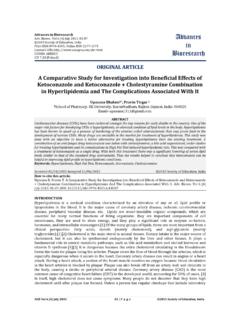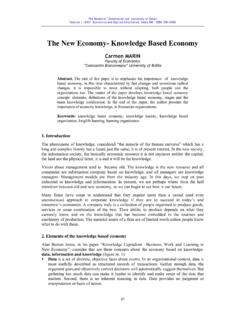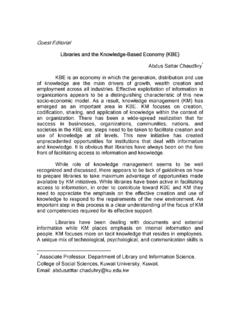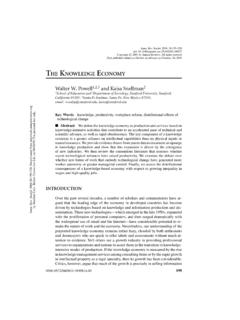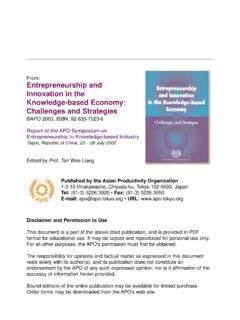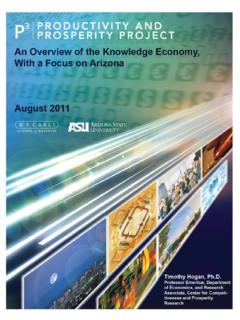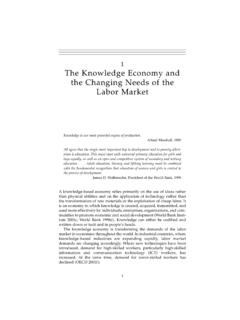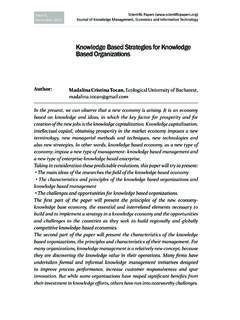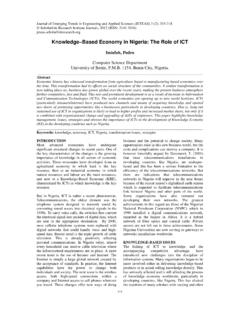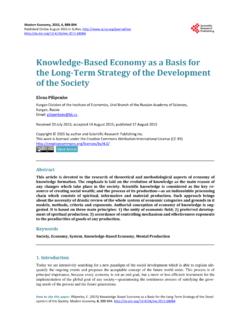Transcription of Knowledge-Based Economy and Society Has Become a Vital ...
1 IJERT Vol 1 [2] December 2010 68 Society of Education, India Research Article ISSN 0976-4089 Knowledge-Based Economy and Society Has Become a Vital Commodity to Countries Ghirmai. T Kefela Thrifty Inc. Branch Manager 10800 NE Homan StPortland, OR 97220 Email: ABSTRACT Technological change is driving demand for skilled labor and spurring an upgrading of skills across economies. The emergence of a Knowledge-Based Economy (k- Economy ) has spawned a new notion of workplace literacy, changing the relationship between employers and employees. The traditional pledge where employees expect a stable or lifelong employment will no longer apply. New ideas or intellectual capital, more than savings or investments, are the new keys to prosperity and to the wealth of nations. The importance of knowledge as a tool that could be used to achieve developmental goals of nations cannot be over emphasized.
2 knowledge is of a decisive importance in economic development of countries. KEYWORDS: innovation, knowledge management and Society , performance knowledge Economy , competitiveness, innovation, governance, education, opportunity, challenges. INTRODUCTION A knowledge Economy is one where organizations and people acquire, create, disseminate, and use knowledge more effectively for greater economic and social development. Increased importance of knowledge provides great potential for countries to strengthen their economic and social development by providing more efficient ways of producing goods and services and delivering them more effectively and at lower costs to a greater number of people. Wealth creation through application of human knowledge and creativity is steadily outpacing wealth creation through extraction and processing of natural resources.
3 knowledge has increasingly Become an important means for value creation. knowledge has Become a Vital commodity to countries, businesses and individuals in the 21st century age of the Knowledge-Based Economies (KBE). Tangible evidence suggests that knowledge and information are capable of helping nations to achieve developmental goals. To capitalize on the knowledge revolution to improve their competitiveness and welfare, developing countries need to build on their strengths and carefully plan appropriate investments in human capital, effective institutions, relevant technologies, and innovative and competitive enterprises. Countries such as Korea, Ireland, Malaysia, and Chile illustrate the rapid progress that can be made. According to Houghton and Sheehan (2000), knowledge Economy emerges from two forces the rise in knowledge intensity of economic activities and the increasing globalization of economic affairs.
4 knowledge Societies are generally characterized with the ability to create, share and use knowledge for the sole purpose of improving upon the general well being of the people as well as making it possible for them to prosper. The Knowledge-Based Economy analyses economic organization and development when the creation, distribution and use of knowledge Become decisive factors. The competitive edge of companies, whatever their size or sector of activity, basically lies in their ability to mobilize and combine knowledge and skills in order to come up with integrated solutions that meet increasingly complex and differentiated needs. Making the most of human assets is decisive factors to have a knowledge based Economy to analyses the economic organizational structures which encourage apprenticeship and knowledge sharing constitute are the most important levers for growth.
5 A number of studies have been done in the area of knowledge societies or economies. UNESCO (2005) report describes a knowledge Society as one which is nurtured by its diversity and its capacities. This is because, every Society in one way or the other has its own knowledge assets and it is only necessary to work towards connecting these assets which are already in the Society . This could be blended with the new methods of developments, spread of knowledge and acquisition. Another important feature proposed by UNDP International Journal of Educational Research and Technology, Vol 1 [2] December 2010: 68 - 75 IJERT Vol 1 [2] December 2010 69 is that knowledge societies must foster knowledge sharing. This is due to the recognition given to knowledge as public incentives and must be made available to every individual of the Society .
6 The increased rapidity and higher capacities of data processing, improved means of communication, the emergence of new needs and new markets all led to very significant gains in productivity. Yet, confronted by the explosion in available information, the rare resource is the ability to give meaning to decisions and actions is in the field of the Knowledge-Based Economy . One aspect of globalization is that of locating players and bringing them together within the chain of knowledge . Spence (2008) in his Growth Report puts out strategies which are needed to sustain growth. This means that when knowledge and all other factors needed for development are put into use to achieve a desired result, strategies must also be put in place to sustain growth. According to Spence, there should be an increase in GDP to the level of 7% or above annually over a given period of time in achieving high growth.
7 The World Bank also places emphasis on the GDP of a country as one of the criteria for measuring a knowledge Society in the knowledge assessment methodology. In order to achieve this high growth, growth auxiliary factors need to be promoted in the country. The thirteen dimensions is the major benchmark of this study and were formulated by Sharma et al (2008) using the four pillars of knowledge Society : Infrastructure, Governance, Human capital and Culture. For a country to be classified or regarded as a knowledge Society , the following dimensions must exist and be sustained as well. The dimensions are: Geographical proximity to market, Net knowledge inflows, ICT accessibility, Rule of law, IP regime, Political knowledge and technology are the heart and mind of the global Economy .
8 The countries that thrive will be those that encourage their people to develop the skills and competencies they need to Become better workers, managers, entrepreneurs, and innovators. Today s policy makers must extend their country s existing strengths through careful investments in education, institutional quality, and relevant technology. They must create enterprises that are knowledgeable enough to recognize new competitive opportunities and skillful enough to convert those opportunities into wealth. Why, then many developing countries have been slow to identify the strands of global knowledge , if the basic components of the knowledge Economy are readily available, why not appropriate for developing countries for growth and innovation? The challenges are due to a weak institutions, limited awareness, and disincentives preventing them from taking the root to the knowledge Economy .
9 Drucker (1998) suggests that knowledge is quickly turning into a factor of production and has the capacity to sideline labor and capital. This supportive of the fact that no nation can do away without knowledge . Every single effort must be made to invest into knowledge . OECD and Asia- Pacific Economic Cooperation (APEC) have both agreed that wealth creation, growth of Economy and general well being of the citizens depend on production, distribution and use of knowledge The developing countries should work to raise awareness among national policy makers should consider embarking on knowledge and innovation based development process to encourage economic actors to combine global and local knowledge to accentuate comparative advantage, and to help leaders to build institutions that foster, rather than discourage, individuals attempts to exploit the competitive opportunities available to knowledge -powered enterprises.
10 To Become successful knowledge economies, countries must act simultaneously on their education base, their innovation systems, and their information and communication technology infrastructure, while also building a high-quality economic and institutional regime. Strategies must be adapted to a country s level of development, and progress is usually gradual, but some countries have been able to achieve spectacular progress in a decade. knowledge and innovation have always played a crucial role in economic and social development. Earlier versions of human capital theory have been invigorated by new growth theorists who argue that it is not just more education that matters, but the kinds of education experiences that foster active learning (Arrow, 1962) and innovative aptitudes (Romer, 2007), have promoted concepts like the creative class as the basis for producing competitive economies.
